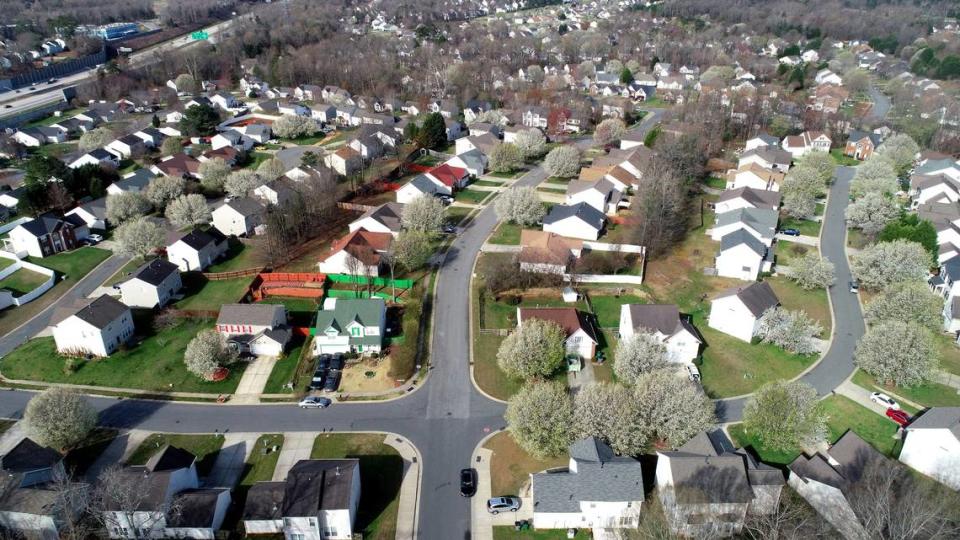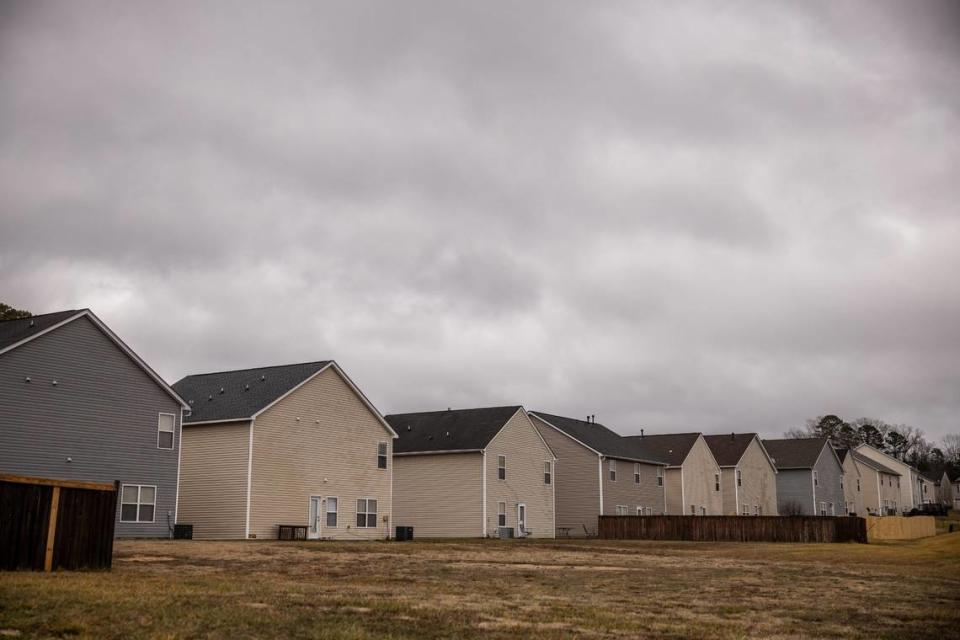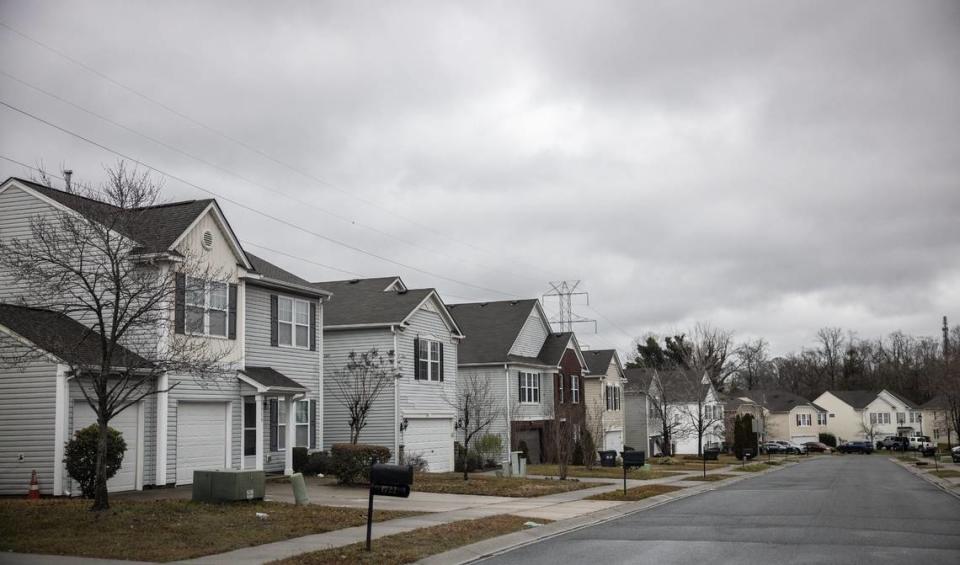Corporate landlords reduce homeownership in Black Charlotte neighborhoods, study says
As national corporate landlords snapped up thousands of properties in Charlotte over the last decade, they triggered a loss of homeownership in Black neighborhoods on par with the Great Recession.
That’s the conclusion of a pair of economists who analyzed the impacts of single-family home sales in Mecklenburg County from 2011 to 2021 in a new working paper. Much of the research focuses on the disproportionate impacts in Black neighborhoods, which the authors define as having a higher percentage of Black residents than the county median.
The study shows that nearly 80% of the homes purchased by large corporate landlords were located in these neighborhoods.
The research also found that purchases by institutional investors led to a decline in property values, decreased political participation, more nuisance code violations and an uptick in crime.
As a share of housing built by 2011, homeownership overall dropped about 2 percentage points due to corporate homebuying, researchers found. But homeownership in Black neighborhoods specifically dropped by about 4 points, equivalent to the decline during the collapse of the housing market in 2008.
“This is a big deal if you think about homeownership — that it had virtually the same changes as we saw in what was a serious and major economic recession that led to lots of people losing their homes,” said Stephen Billings, associate professor of real estate at the University of Colorado-Boulder and one of the working paper’s co-authors.

Although not yet peer reviewed, the research posted to the open-access Social Science Research Network Nov. 30 is some of the earliest and most direct evidence of how the explosion of corporate landlord ownership has impacted Charlotte, among the top markets for the national single-family home rental home business.
All but nonexistent prior to 2012, the industry grew quickly after the 2008 financial crisis across the U.S., buoyed by Wall Street cash and the federally-endorsed bulk purchase of foreclosed properties. In the 2022 series Security for Sale, The Charlotte Observer and The News & Observer detailed that growth with first-of-its kind precision in North Carolina, where about two dozen large, national corporations at the time owned more than 40,000 single-family homes across the state, including about 1 of 20 in Charlotte.
These firms owned one-quarter of all the rental houses in Mecklenburg County as of early 2022, the investigation found.
Billings and co-author Adam Soliman, a postdoctoral researcher at the Center for Economic Performance at the London School of Economics, used data published with Security for Sale to identify institutional investors among hundreds of subsidiaries and holding companies in North Carolina property records.
Industry: residents need ‘more options, not fewer’
In the Charlotte area alone, the new research found, large corporate landlords such as Invitation Homes and Progress Residential bought 7% of the single-family homes sold between 2011 and 2021, converting the vast majority to rentals.
The National Rental Home Council, a trade group for some of the largest of these firms, has maintained that such sales grant people more housing options, especially in neighborhoods previously available only to families with the cash to buy.
David Howard, the trade group’s CEO, did not directly address the study’s findings when contacted by The N&O. But he noted in a statement that rental homes “play an important role in helping communities address their housing affordability needs.”
“Our residents are telling us the search for housing is very difficult — mortgage rates are at the highest levels since the year 2000. The inventory of available homes is at historic lows,” Howard said. “In this environment we need to look for ways to expand the diversity of housing opportunities so that we can provide families with more options, not fewer.”

But the new findings are in step with criticism of the industry and its impact on communities — especially in a nation where home ownership is how most families build wealth.
“Renting is an option,” said Mecklenburg Board of County Commissioners Vice Chair Mark Jerrell, who’s been outspoken on the impacts of corporate landlords. “But are we just saying as a society we’re going to remove the option for homeownership for the average resident so they don’t get to participate in the American Dream?”
Comparing neighbors, researchers tease out landlord impacts
The housing market is, suffice it to say, complicated.
Some homebuyers face competition from corporate landlords. But they’re also battling dwindling housing stocks, increasing mortgage rates, high prices — and a host of other neighborhood-specific factors.
To untangle those effects, the researchers created two categories of homes purchased from 2011 to 2021 — those within 500 feet of a corporate-owned rental home and those a little further away. With that geographic distinction, they studied what happened before and after an institutional investor bought a home, comparing impacts within the same or nearby neighborhoods.
“Everything else is the same,” Billings said. “The only difference is one house just flipped over.”
That allowed them to examine shifts — changes in property values, for example — block by block, instead of capturing trends in the larger housing market, Soliman said.
“Overall prices could be going up,” Soliman said. “But the fact is that the focal point of the purchase is causing this impact in the immediate vicinity.”
That’s important, because although corporate landlords own a small percentage of rental houses overall, they’re especially concentrated in certain areas, The N&O’s reporting has found.
For Black neighborhoods specifically, Billings said, purchases by corporate landlords resulted in a nearly 4-point decline in ownership of 2011 housing, from about 60% to 56%. That’s a drop on par with the impact of overall homeownership during the Great Recession.
The primary driver, he said, is the “mechanical” relationship between corporate landlords and supply. By buying up existing homes and outcompeting other buyers with all-cash offers, especially in neighborhoods full of starter homes, the research shows firms are pushing out potential homeowners, he said.

And that has serious economic implications for families in the future.
“Decades later, they have tremendously less wealth, because home equity is really the biggest source of wealth for most households,” Billings said.
The study found other “spillover” effects from corporate landlord purchases between 2011 to 2021 too. Homes especially close to properties owned by institutional investors — within 250 feet — saw a 2% decline in property values, an effect “almost exclusively limited to majority Black suburban neighborhoods.” Compared to other homes, properties close to investor purchases saw a 2% increase in property crime and a 3% increase in violent crime.
The number of registered voters dropped 1%, researchers found, signaling a loss of political participation.
And nuisance code violations — neglected property maintenance, unkempt lawns and the like — ticked up 8%.
Brian An, assistant professor at the School of Public Policy at Georgia Tech, said the findings are convincing. And they stand out from other research, he said, because of the number of outcomes they examine.
The conclusions also align with An’s research focused on the Atlanta area published earlier this year, which found that Black residents there saw a disproportionate decrease in homeownership amid the growth of corporate investors compared to other racial groups.
“The dominant findings from all these different types of research suggest that they target majority-minority neighborhoods,” An said.
The widening gap in Black and white homeownership predates the rise of corporate landlords. That’s what makes the potential impacts on Black households evidenced in the new research on Charlotte “really insidious,” said Cornell University associate professor of city and regional planning Suzanne Lanyi Charles.
“If we’re seeing another factor that is making that wealth-building more difficult for Black households, then that’s really a problem,” said Charles, after reading the new results. “This sort of evidence really could move the needle on public policy.”
For policymakers, options may be limited
Housing experts say it’s hard to know what that public policy — whether it’s on the local, state or federal level — would look like.
Not much policy has changed since early 2022, when the Security for Sale investigation showed that political leaders largely watched from the sidelines as the holdings of corporate landlords grew.

Two congressional bills filed since then, neither likely to gain traction, propose tax penalties and ownership caps for corporate purchases of single-family homes. A North Carolina Democrat earlier this year introduced his own 100-property cap in the state legislature that failed to move forward.
Meanwhile, a patchwork of bans from homeowners’ associations established waiting periods and other limitations on rentals, and tenants’ rights groups have gone door to door to organize renters.
In Mecklenburg County, the county commission is continuing to study the issue and explore responses such as expanding affordable housing and rental assistance, Jerrell said.
But he said potential local solutions are limited.
“Without a real comprehensive strategy that includes all levels of government, what we’re going to be doing is deploying reactive tactics,” Jerrell said.
There’s a good reason why it’s a problem that’s so hard to regulate, Charles said.
“Property ownership is baked into the U.S. The ability to buy property and profit off of it, it’s fundamental to the country,” she said. “Curbing the practices of companies doing just that is tricky.”
And new rules could have unintended side effects.
A cap on corporate ownership could have impacts in the short term, said Georgia Tech’s An. But it could also mean a shrinkage of rental units in the long term.
Measures that strengthen tenant protections, mandate property inspections or ensure transparency in ownership, he said, could improve the rental experience without reducing housing supply.
“If this is going to continue to grow, or show up in other variants of business models such as build-to-rent, I think the longer-term perspective would be holding them to higher standards,” An said.

